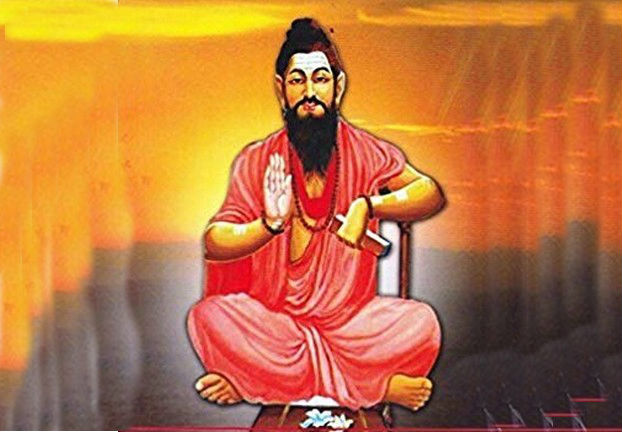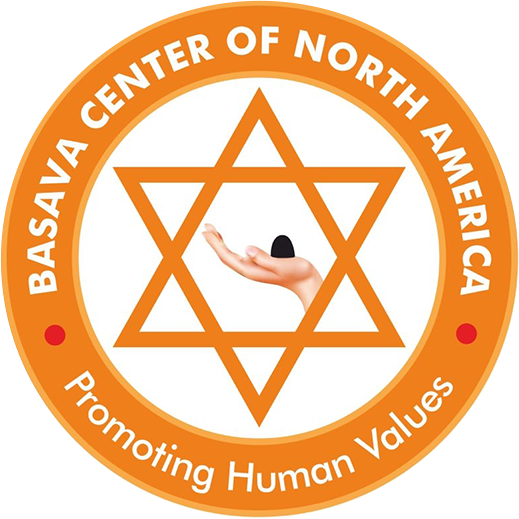
Allama Prabhu
Allama Prabhu was a 12th-century mystic-saint and Vachana poet of the Kannada language, propagating the unitary consciousness of Self and Shiva. Allama Prabhu is one of the celebrated poets and the patron saint of the Lingayata movement that reshaped medieval Karnataka society and popular Kannada literature.
Allama Prabhu, The Torchbearer of Democratic Values
Any religion in the world will grow progressively if it has inherent qualities of being democratic and egalitarian. A characteristic of democratic ethos of a religion is internal introspection or internal criticism. Major religions of the world have internalised these values and have grown worldwide. Internal democratic impulses have helped these religions spread their teachings widely and successfully.
Lingayat religion is not an exception to such religious orientation and values. The principle values of this religion are embodied in the 12th Century Vachana literature. Hundreds of Vachana composers have expressed or articulated their experiences through this literature. These composers belonged to different social and economic backgrounds. They pursued different professions which ranged from lowest to the highest. Yet, they were united in their zeal for social reformation through this literature. It became their mouthpiece. Lingayat religion too was born out of such varying voices and interests of the needy and the downtrodden. This made it the religion of the common people. One of the most articulate and internal critics of this religion is Allama Prabhu.
Allama Prabhu was a 12th-century mystic-saint and Vachana poet (called Vachanakara) of the Kannada language. He was born in Balligavi of present day Shikaripura of Karnataka. His occupation was playing “maddale” or the drum in the temple. He propagated the unitary consciousness of Self and Linga, the image representation of Invisible divinity (God). He is one of the celebrated composer of Vachanas and the patron saints of the Lingayata movement that reshaped medieval Karnataka society and popular Kannada literature. He is included among the “Trinity of Lingayatism”, along with Basavanna, the founder of the movement, and Akka Mahadevi, the most prominent woman poet.
Allama Prabhu’s style has been described as mystic and cryptic, rich in paradoxes and inversions (bedagu mode), staunchly against any form of symbolism, occult powers (siddhis) and their acquisition, temple worship, conventional systems and ritualistic practices, and even critical of fellow Lingayat devotees and poets. However, all his poems are non-sectarian and some of them even use straight forward language. Allama Prabhu probes and explores the limits and possibilities of language and silence; wholeness of man; nature of experience; forgetfulness and memory; sign, signifier and signification.
Allama Prabhu’s wisdom is reflected in his Vachanas, only a small portion of which are on the devotee aspect (bhakta). More than half of the poems dwell on the later phase (sthala) in the life of a saint, most are about union with god and of realization (aikya). His compositions have a pen name “Guheswara” or “Lord of the caves” or to refer to the Lord who resides within.
Allama was a wandering mystic. He did not become static man. He was an independent voice. He was not confined to family or societal norms. He transcended them. Many consider him a philosopher of highest calibre and he was a “virakta” (the one who has renounced the worldly affairs). He cannot be framed within any established school of philosophy or literature. He carved his own identity as a poet, philosopher, guide and reformer. He was a person of keen intelligence and rare intuition, frank and fearless in his expression. He always protested against the order of established religion and upheld the value of personal experience against learned theology. Despite his reservations, he stood as a rock on which the 12th century Lingayat movement for social and economic freedom built itself. He guided Basavanna, the leader of the Lingayat movement, for wholesome organisation and coherent structure for this movement.
Allama Prabhu’s Vachanas known to cover an entire range, from devotion to final union with God. A Vachana by Allama gives glimpses of his viewpoints and mysticism,
What a wonder!
I saw intellect fleeing, when the heart came.
I saw the temple fleeing, when God came.
Another Vachana by Allama is highly mystical, philosophical and it defines who is a true Sharana (devotee),
Equanimity merged in peace,
Mind merged in knowledge
Passion merged in dispassion
If he can live like that
Look, Guheshwara, he is the true Sharana.
Vachanas
೧
ಅಂಗಜೀವಿಗಳೆಲ್ಲಾ ಅಶನಕ್ಕೆ ನೆರೆದು,
ಲಿಂಗವಾರ್ತೆಯ ನುಡಿ[ವಿ]ರಯ್ಯಾ.
ಕಾಯಜೀವಿಗಳೆಲ್ಲಾ ಕಳವಳಿಸಿ
ಮನಬಂದ ಪರಿಯಲ್ಲಿ ನುಡಿವಿರಿ.
ಗುಹೇಶ್ವರಲಿಂಗ ನಿಮಗೆಲ್ಲಿಯದೋ?
೨
ಅಂಗದ ಕಳೆ ಲಿಂಗದಲ್ಲಿ ಅರತ ಬಳಿಕ,
ಅಂಗವೆಂಬ ಶಂಕೆಯಿಲ್ಲ ನೋಡಾ ಶರಣಂಗೆ.
ಪ್ರಾಣದ ಕಳೆ ಅರಿವಿನಲ್ಲಿ ಅರತ ಬಳಿಕ,
ಶಬ್ದ ಸಂದಣಿಗೆ ಹಂಗಿಲ್ಲ ನೋಡಾ,
ಶರಣ ನಡೆದಡೆ ನಿರ್ಗಮನಿ, ನುಡಿದಡೆ ನಿಶ್ಯಬ್ದಿ!
ಗುಹೇಶ್ವರನ ಶರಣಂಗೆ ಕುರುಹಿಲ್ಲ ಕೇಳಾ, ಎಲೆ ಅವ್ವಾ.
೩
ಅಂಗದ ಕೈಯಲ್ಲಿ ಲಿಂಗ, ಮನದ ಕೈಯಲ್ಲಿ ಸಂಸಾರ,
ಎಂತಯ್ಯಾ ನಿನ್ನ ಪ್ರಾಣಲಿಂಗವೆಂಬೆ?
ಹೊರಗೆ ಕುರುಹಾಗಿ ತೋರುತ್ತಿದೆ.
ತನುವಿಗೆ ತನು ಸಯವಾಗದು ಮನಕ್ಕೆ ಮನ ಸಯವಾಗದು,
ಎಂತಯ್ಯಾ? ನಿನ್ನ ಪ್ರಾಣಲಿಂಗವೆಂಬೆ ಗುಹೇಶ್ವರಾ.
೪
ಅಂಗದ ಮೇಲೆ ಲಿಂಗಸಾಹಿತ್ಯವಾದ ಬಳಿಕ
ಸ್ಥಾವರದೈವಕ್ಕೆರಗಲಾಗದು.
ತನ್ನ ಪುರುಷನ ಬಿಟ್ಟು ಅನ್ಯಪುರುಷನ ಸಂಗ ಸಲ್ಲುವುದೇ?
ಕರಸ್ಥಲದ ದೇವನಿದ್ದಂತೆ
ಧರೆಯ ಮೇಲಣ ಪ್ರತಿಷ್ಠೆಗೆರಗಿದಡೆ
ನರಕದಲ್ಲಿಕ್ಕುವ ಕೂಡಲಸಂಗಮದೇವ.
೫
ಅಂಗದಲ್ಲಿ ಮಾಡುವ ಸುಖ, ಲಿಂಗಕ್ಕದು ಭೂಷಣವಾಯಿತ್ತು.
ಕಾಡುಗಿಚ್ಚಿನ ಕೈಯಲ್ಲಿ ಕರಡ ಕೊಯಿಸುವಂತೆ
ಹಿಂದೆ ಮೆದೆಯಿಲ್ಲ, ಮುಂದೆ ಹುಲ್ಲಿಲ್ಲ.
ಅಂಗ ಲಿಂಗವೆಂಬನ್ನಕ್ಕರ ಫಲದಾಯಕ,
ಲಿಂಗೈಕ್ಯವದು ಬೇರೆ ಗುಹೇಶ್ವರಾ.
1
You who live for body,
assemble for food and talk of linga;
You who live for body, converse with anxiety and speak as the mind dictates-
How can you find Guheshwara linga?
2
When the brightness of the body dissolves in linga distress of the body is no more for the sharana.
When the brightness of breath dissolves in awareness din of speech is no more.
When sharana moves, he is still, when he speaks he is silent.
Listen O mother,
for the sharana of Guheshwara there is no sign.
3
Linga in the hand
and the material world in the mind, how can you say you are Praanalinga?
Externally it appears as a sign.
Body is not right with body,
and mind is not right with mind.
How can you say you are Praanalinga?
I call You Praanalinga Guheshwara.
4
Once linga relates with body look, knowledge settles in praana.
The duality of inside and outside
is merged in one meaning
as I think of you, Guheshwara.
5
The pleasure the body takes is proper for linga.
It is like wild fire cutting hay.
There will neither be hay behind, nor grass ahead.
It is fruitful as long as you speak of linga and body,
but lingaikya is something different, Guheshwara.


